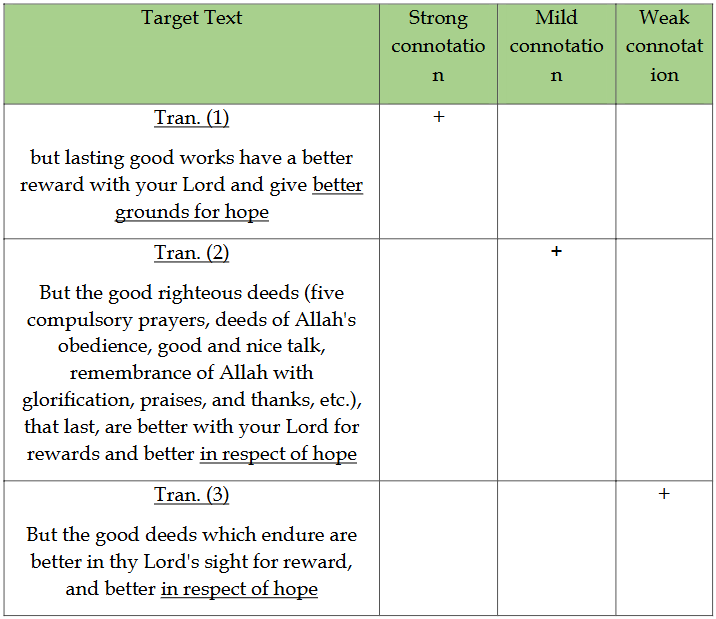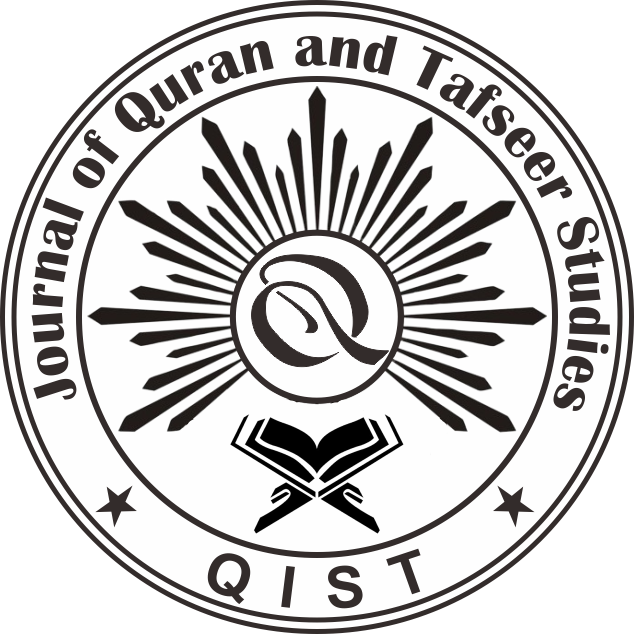EXPLORING SYNTACTIC AND CULTURAL PROBLEMS FACED BY TRANSLATORS IN TRANSLATING THE QURANIC ARABIC HOPE WORD L-AMALU لَمَألْا IN SURAHS AL-HIJR AND AL-KAHF INTO ENGLISH
DOI:
https://doi.org/10.23917/qist.v2i2.1679Keywords:
Al-Hijr, Al-Kahf, Arabic hope word, cultural problems, the Holy Quran, translatingAbstract
The translation of the uniqueness of the Holy Quran into English can be addressed and discussed from various linguistic and stylistic lexical, syntactic, and cultural views and standpoints. The Quranic Arabic words/terms are vivid and magnificent with several nuances of meaning; a case which makes it difficult to be rendered accurately. This study made an effort to analyze syntactic and cultural problems faced by translators in translating the Quranic Arabic hope words l-amalu لَمَألْا in Surahs Al-Hijr and Al-Kahf into English. The findings of the study showed that the translators of the Holy Quran into English faced cultural problems because Quranic Arabic culture-specific terms have no counterpart in the English culture. Also, part of the difficulties and quandaries in rendering such terms exists in the fact that these words need an awareness of the Arabic-Islamic culture with all its religious values and mores. The findings of the study also brought to light that the Quranic Arabic hope words l-amalu لَمَألْا are culture-specific par excellent. They denote a type of translation inequivalent because they cannot be adequately rendered by offering their denotative meanings.
References
Abdelkarim, M. B. A., & Alhaj, A. A. M. (2022). in Rendering the Positive Character Traits in the Holy Quran into English: Justice as a Model. Journal of Positive Psychology and Wellbeing, 6(2), 1970-1981.
Akan, M. F., Karim, M. R., & Chowdhury, A. M. K. (2019). An analysis of Arabic-English translation: Problems and prospects. Advances in Language and Literary Studies, 10(1), 58-65
Al-Ali, M. N. (2004). Familiar words in unfamiliar contexts. Perspectives: Studies in translatology, 12(2), 134-144.
Aldahesh, A. Y. (2021). The (Un) translatability of Qur'anic idiomatic phrasal verbs: a contrastive linguistic study. Routledge.
Allaithy, A. (2013). Qur'anic Term Translation. A Semantic Study from Arabic Perspective (No. 7). Maklu.
Alhaj, A. A. M. (2020). An Investigation of Omission and Addition Phenomena in Quranic English Translation of Nessim Joseph Dawood: A Morpho-Syntactic and Ideo-Cultural Analytical Study. Advances in Language and Literary Studies, 11(6), 63-71.
Alhaj, A. A. M. (2022). Identifying Causes of Pragma-linguistic Difficulties in Translating the Embedded Meanings of the Quranic Love Words into English: A Comparative Interdisciplinary Study.
Alhaj, A. A. M., & Abdelkarim, M. B. A. (2022). Morphosyntactic Problems Encountered in Translating some Selected Longest Qur'anic Words into English: A New Linguistic Approach. International Journal of Linguistics, Literature, and Translation, 5(1), 247-257
Alhaj, A. A. M. (2022). The Cultural and Semantic Problems Encountered in Translating the Arabic Qur'anic-Specific Lexica "Alkyed" in Surat Yusuf into English. AWEJ for Translation & Literary Studies, 6(4).
Alhaj, A. (2015). New Theory of the Holy Qur'an Translation: A Textbook for Advanced University Students of Linguistics and Translation. Anchor Academic Publishing (aap_verlag).
Alhaj, A., & Omer, M. (2017). Problems of translating Qura'nic euphemism: a comparative socio-pragmatic study. American International Journal of Contemporary Research, 7(4), 104-117.
Alhaj, A. A. M. (2020). An Investigation of the Underlying Linguistic Problems in the Translation of Surah Quraish into English: A Comparative Syntactic and Semantic Study. Advances in Language and Literary Studies, 11(5), 66-71.
Al-Halawani, A. (2016). Translation of Religious Terminology: al-fat-h al-islami as a Model. International Journal of English Linguistics, 6(3), 136-147
Ali, A. M. Lexical and Semantic Problems in Translating the Quran: A Comparative
Study. TRANSLATOLOGIA: Issue 1/2020, 52.
Ali, H., & Sayyiyed Al-Rushaidi, S. M. (2017). Translating idiomatic expressions from English into Arabic: Difficulties and strategies. Arab World English Journal (AWEJ) Volume, 7.
Al-Jabari, R. (2008). Reasons for the possible incomprehensibility of some verses of three translations of the meaning of the Holy Quran into English (Doctoral dissertation, University of Salford (United Kingdom)
Al-Jalalayn, T. (2008). Translated by Feras Hamza. Amman: Royal Aal al-Bayt Institute for Islamic Thought. Available at http://altafsir. com
Al-Kharabsheh, A., & Al-Jdayeh, G. (2017). Translatability of Qur'anic Antonymy. Jordan Journal of Modern Languages and Literature, 9(1), 51-72.
Al-Kenai, J. B. (1985). Some linguistic and cultural problems of English-Arabic translation and their implications for a strategy of Arabization. The University of Glasgow (United Kingdom.
Al-Qurtubi, M. (1999), AL-Jameal Liahkam AL-Qur'an, Dar-Al-Fikr, Beirut, Lebanon.
Al-Tabari, M. (1981). Jami' al-Bayan fi Tawil al-Qur 'An, Dar al-Ma'arif, Cairo.
Awwad, M. (1990). Equivalence and translatability of English and Arabic idioms. Papers and Studies in Contrastive Linguistics, 26(57), 57-67.
Baker, Mona (Ed.), 1992. Other Words: a Coursebook on Translation. Routledge, London.
Ben-Osman, M. M. (2005). Translation equivalent of literacy language between Arabic and English. The University of Manchester (United Kingdom).
Casagrande, J. B. (1954). The ends of translation. International Journal of American Linguistics, 20(4), 335-340. http://dx.doi.org/10.1086/464296.
Dweik, B. S., & Suleiman, M. (2013). Problems encountered in translating cultural expressions from Arabic into English. International Journal of English Linguistics, 3(5), 47.
Eagleton, T. (2019). Hope without optimism. Yale University Press.
Emara, S. A. E. (2013). Extraordinary Vocabulary of the Qur'an and Related Translation Problems. International Journal of Linguistics, 5(1), 248.
Esposito, J. L. (Ed.). (2004). The Oxford Dictionary of Islam. Oxford University Press.
Faiq, S. (Ed.). (2004). Cultural encounters in translation from Arabic (Vol. 26). Multilingual Matters.
Farghal, M. (2012). Advanced issues in Arabic-English translation studies. Kuwait: Kuwait University Publication Council.
Furgani, K. T. (2016). A study into the challenges of subtitling English into Arabic. Liverpool John Moores University (United Kingdom).
Gaibani, A. A., & Elmenfi, F. (2018). Micro-Linguistics Perspective in Translation Sensitive Issues of Surah Al Hujurat (The Chambers) into English. Annals of Language and Literature, 2(3).
Gutt, E. A. (1990). A theoretical account of translation without a translation theory. Target. International Journal of Translation Studies, 2(2), 135-164.
Hassanein, H. S. (2017). Translating aspects of lexical-semantic opposition from Qur'anic Arabic into English: a cross-linguistic perspective. Perspectives, 25(1), 137-156.
Ibn Kathir, H. D. (2002). Tafsiru alQur'ani alkarim [Commentary on the Quran]. Beirut, ebanon: Maktabat Nour Al'ilmijj.
Ibn Mandhur, M. (1883), Lisan AL-Arab, Al-Matb'ah al-Kubra al-'Amiriyah, EgyptHaleem. In M. A. (Ed.), The Qur'an (pp. 25). OUP Oxford.
Jumeh, M. S. (2006). The loss of meaning in translation: its types and factors concerning ten English translations of the meaning of the Qur'an (Doctoral dissertation, University of Wales Trinity Saint David).
Kashgary, A. D. (2011). The paradox of translating the untranslatable: Equivalence vs. non-equivalence in translating from Arabic into English. Journal of King Saud University-Languages and Translation, 23(1), 47-57.
Khan, M. M., & Al-Hilali, M. (1996). The noble Quran: English translation of the meanings and commentary. Madina: King Fahd Complex for the Printing of the Holy Quran.
Landes, R. A., & Landes, R. (2011). Heaven on earth: The varieties of the millennial experience. OUP USA.
Lataiwish, M. S. (1995). An Analysis of Literary Translation Arabic/English. University of Glasgow (United Kingdom).
Mansoor, K. (2018). Translation Across the Difficulties of Equivalence Concept. Buletinul Stiintific al Universitatii Politehnica din Timisoara, Seria Limbi Moderne, (17), 55-66.
Nida, E. A. (1964). Toward a science of translating: With special reference to principles and procedures involved in Bible translating. Leiden, Netherlands: E.J. Brill.
Ogilvy, J. (2011). Facing the fold: from the eclipse of Utopia to the restoration of hope. foresight.
Pickthall, M. (2001). The Meaning of the Glorious Qur'an: An explanatory translation. London: George Allen and Unwin Ltd
Saraireh, M. A. (1990). Some lexical and syntactic problems in English-Arabic translation. The University of Wisconsin-Madison.
Schaffner, C. (1998). The concept of norms in translation studies. Current issues in language & society, 5(1-2), 1-9.
Shojaei, A. (2012). Translation of idioms and fixed expressions: Strategies and difficulties. Theory and Practice in Language Studies, 2(6), 1220-1229.
Utz, A. (2011). Psychology from the Islamic perspective. International Islamic publishing house.

Downloads
Submitted
Accepted
Published
How to Cite
Issue
Section
License
Copyright (c) 2023 Ali Albashir Mohammed Alhaj

This work is licensed under a Creative Commons Attribution 4.0 International License.














